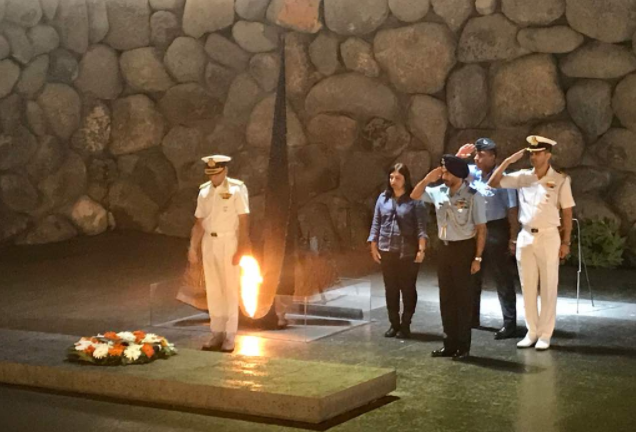
India’s Navy chief, Admiral Sunil Lanba’s, began a five-day trip to Israel earlier this week, meeting with his Israeli counterparts, Israel Defense Forces Chief of Staff Lt. Gen. Gadi Eisenkot and Israel Navy Commander Maj. Gen. Eli Sharvit. Lanba’s visit highlighted strengthening defense ties between the two nations and comes shortly before Indian Prime Minister Narendra Modi travels to the Jewish State in early July.
During his time in Israel, Lanba and Eisenkot discussed defense cooperation and ways to improve the region’s security situation. Lanba also paid tribute at the graves of fallen Indian soldiers who helped liberate the port city of Haifa from the Ottoman Empire in 1918.
Beyond the talks, India has become one of the biggest export markets for Israeli defense contractors. In April, Israeli Aerospace Industries (IAI) agreed to sell the Indian army $2 billion worth of medium-range surface-to-air missiles and long-range surface-to-air missiles for Indian carriers. Additionally, late last month, IAI signed a $630 million agreement with India’s Bharat to supply Barak 8 medium-range surface-to-air missiles for four Indian naval vessels. Other Indian defense tenders could entail sales of updated short-range surface-to-air missiles to replace the Barak-1 and Spike anti-tank weapons. Since 2000, Israel has also invested over $100 billion through foreign direct investments (FDI’s) in India.
Short after Lanba’s arrival, a senior Israeli official announced that Modi would not be meeting with Palestinian officials during his first trip to Israel early next month. The senior Israeli official went on to say, “It’s a great achievement for us” as Israelis attempt to isolate the Palestinians diplomatically and focus on the successful bilateral partnership.
New Delhi’s decision underscores Modi’s new strategic priorities, enhancing India’s military capacity and increasing its engagement beyond its close neighbors and farther out to regional countries. India’s Cold War foreign policy of “non-alignment” gave way to a series of bilateral trade deals with countries in the region. Modi’s visit to Israel could help both achieve their ends: Jerusalem will enhance relations with a major diplomatic and economic partner, while New Delhi will increase its access to high-tech weaponry, enhancing its ability to achieve regional security.





